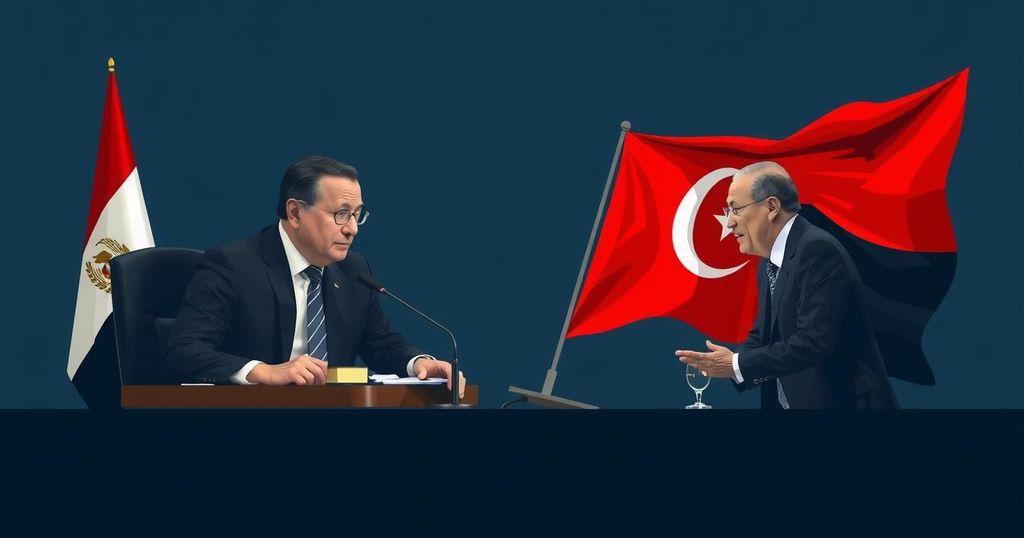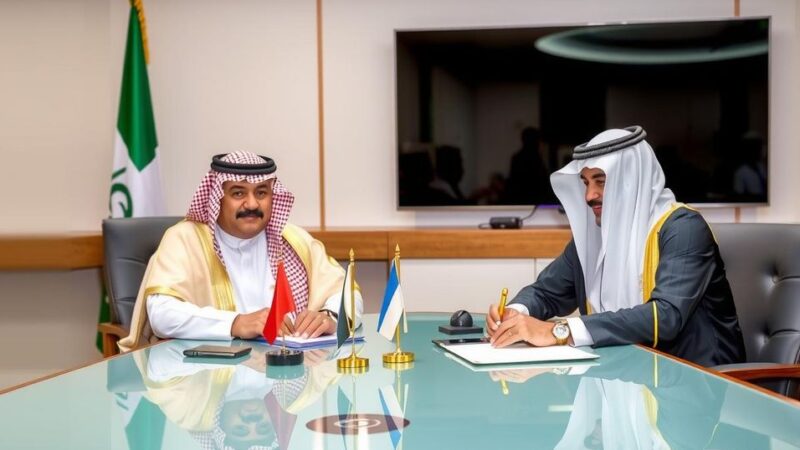The renewed relations between Egypt and Turkey may facilitate peace among Libya’s rival factions. This development follows a temporary halt of oil exports due to a dispute over the central bank, which has now been resolved, though underlying issues continue. The collaboration aims to achieve greater political stability in Libya, with both nations benefiting economically amidst their domestic crises. Continuous dialogue is essential for tangible results regarding Libyan stability.
The recent thaw in relations between Egypt and Turkey, historically contenders supporting opposing factions in Libya, presents a significant opportunity to mitigate the ongoing tensions within the North African nation. Following a temporary suspension of oil exports due to a dispute concerning the Libyan central bank—responsible for overseeing these exports—activity resumed this month. Jalel Harchaoui, a researcher at the Royal United Services Institute, emphasized that while this situation has seen some resolution, underlying issues remain that warrant further attention. The conflict that temporarily interrupted oil exports stemmed from disagreements between Libya’s two rival governments and was ultimately settled after extensive negotiations; however, Harchaoui cautions that the ramifications of this discord persist, contributing to a potentially unstable environment where various factions in Tripoli may attempt to exploit the recent developments. The warming of ties between Turkey and Egypt seems to bring a glimmer of hope, as Egyptian President Abdel Fattah al-Sisi affirmed a commitment to collaboration aimed at achieving political stability in Libya during a joint press conference with Turkish President Recep Tayyip Erdogan. Historically, Libya has been a focal point of rivalry between Egypt and Turkey, with Egypt backing Khalifa Haftar in the east and Turkey supporting the western Government of National Unity based in Tripoli. Yet, the emerging cooperation between these nations may play a pivotal role in addressing the crises impacting Libya. Murat Aslan from the SETA Foundation for Political, Economic and Social Research commented on the potential for both Egypt and Turkey to collectively engage the Tripoli government towards agreeable terms, framing this collaboration as mutually beneficial. As both nations grapple with severe economic challenges, the allure of economic cooperation within Libya is a compelling factor driving their reconciliatory efforts. Asian and Egyptian businesses are reportedly establishing economic partnerships, ensuring that both countries benefit from opportunities in Libya. In addition, Turkey is anticipating Egypt’s support in advocating for an agreement with the Tripoli administration for the exploration of oil reserves within Libyan waters. Conversely, Cairo is pushing for the ousting of Prime Minister Abdul Hamid Dbeibeh, who is aligned with Ankara. Despite these differences, Harchaoui insists that both parties are committed to maintaining dialogue, with Egypt’s alignment being essential at crucial junctures. However, he stresses the need for tangible outcomes from their ongoing communications.
The context of this article revolves around the geopolitical dynamics in Libya, particularly the historical rivalry between Egypt and Turkey, as each nation has supported opposing factions in the Libyan civil conflict. The complexities of this situation have intensified with the management of Libya’s oil exports, significantly influencing the country’s economy and political landscape. After a period of tension characterized by a dispute over the central bank’s control, the resumption of oil exports highlights the fragility and volatility of Libya’s situation. The recent efforts by Egypt and Turkey to foster cooperation signal a potential shift in their conflicting interests, paving the way for political dialogue and economic collaboration that may stabilize Libya.
In summary, the recent rapprochement between Egypt and Turkey signals a hopeful prospect for alleviating tensions among Libya’s conflicting factions. As both nations strive to exert influence and navigate their respective economic challenges, their collaboration could potentially stabilize the volatile environment in Libya. The commitment to continuous dialogue highlighted by officials from both countries will be critical in addressing the complex issues that remain unresolved and fostering a political framework conducive to lasting peace in the region.
Original Source: www.rfi.fr







